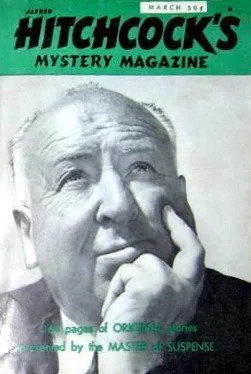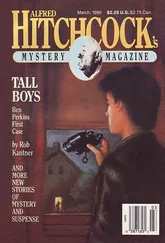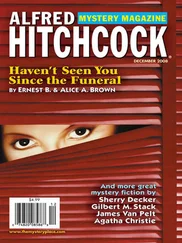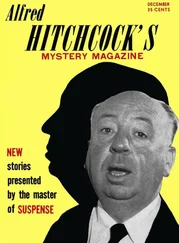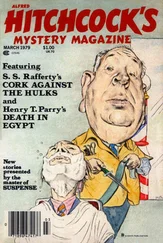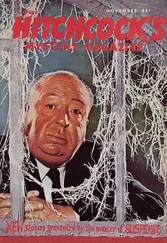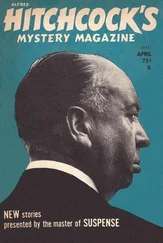Ричард Деминг - Alfred Hitchcock’s Mystery Magazine. Vol. 9, No. 3, March 1964
Здесь есть возможность читать онлайн «Ричард Деминг - Alfred Hitchcock’s Mystery Magazine. Vol. 9, No. 3, March 1964» весь текст электронной книги совершенно бесплатно (целиком полную версию без сокращений). В некоторых случаях можно слушать аудио, скачать через торрент в формате fb2 и присутствует краткое содержание. Город: Concord, Год выпуска: 1964, Издательство: H.S.D. Publications, Жанр: Детектив, на английском языке. Описание произведения, (предисловие) а так же отзывы посетителей доступны на портале библиотеки ЛибКат.
- Название:Alfred Hitchcock’s Mystery Magazine. Vol. 9, No. 3, March 1964
- Автор:
- Издательство:H.S.D. Publications
- Жанр:
- Год:1964
- Город:Concord
- ISBN:нет данных
- Рейтинг книги:5 / 5. Голосов: 1
-
Избранное:Добавить в избранное
- Отзывы:
-
Ваша оценка:
- 100
- 1
- 2
- 3
- 4
- 5
Alfred Hitchcock’s Mystery Magazine. Vol. 9, No. 3, March 1964: краткое содержание, описание и аннотация
Предлагаем к чтению аннотацию, описание, краткое содержание или предисловие (зависит от того, что написал сам автор книги «Alfred Hitchcock’s Mystery Magazine. Vol. 9, No. 3, March 1964»). Если вы не нашли необходимую информацию о книге — напишите в комментариях, мы постараемся отыскать её.
Alfred Hitchcock’s Mystery Magazine. Vol. 9, No. 3, March 1964 — читать онлайн бесплатно полную книгу (весь текст) целиком
Ниже представлен текст книги, разбитый по страницам. Система сохранения места последней прочитанной страницы, позволяет с удобством читать онлайн бесплатно книгу «Alfred Hitchcock’s Mystery Magazine. Vol. 9, No. 3, March 1964», без необходимости каждый раз заново искать на чём Вы остановились. Поставьте закладку, и сможете в любой момент перейти на страницу, на которой закончили чтение.
Интервал:
Закладка:
“You stay in that position for five minutes, Arthur,” he instructed. “If I see your head above the counter, I’ll blow it off. Understand?”
“I understand,” Gilbert said.
Without hurry Cannon walked from the store, climbed into the car in front of the store and drove away. A quarter block away he removed the fake glasses and false nose, folded them and put them into his inside breast pocket. Six blocks farther he abandoned the car in an alley across the street from a subway entrance, first carefully wiping the steering wheel and shift lever with a handkerchief. Ten minutes later he was on a subway to Brooklyn.
Within a half hour of the time he had left the liquor store, Cannon was ascending to the street from the Fulton Street station. He found his car parked where he had left it, a dozen yards from the subway entrance. He parked in front of his rooming house exactly at ten P.M. Tiptoeing past his landlady’s room, he went up the stairs without her hearing him. He always left for a job surreptitiously and returned as quietly. You never knew when a landlady’s testimony that you had been in your room all evening might come in handy.
In his room he counted the take. It came to five hundred and sixty-two dollars. It wasn’t exactly in a class with the Brinks robbery, he thought, but with his simple needs it would carry him for weeks.
Part of the enjoyment Harry Cannon derived from his chosen profession was the newspaper writeups he got. There was a scrapbook in a suitcase at the back of his closet containing news clippings of every job he had pulled There were twenty-two news accounts in all, the coverage on each progressively more detailed. The first, dated a little more than two years earlier, was a back-page, one-paragraph item describing a Bronx drugstore stickup by a man wearing a dime-store false nose and lensless frames. The latest was a full-column front-page spread headlined: NOSE BANDIT STRIKES AGAIN.
Cannon spent many quiet evenings in his room reading over his scrapbook. He particularly enjoyed comparing the sensational treatment his more recent exploits received with the routine coverage of his early jobs. Three kills had made him about the hottest news copy in town.
On Friday morning he was up early to buy all the New York papers. Back in his room again, he went through them one by one with growing puzzlement.
There wasn’t a single mention of last night’s robbery.
After some thought, it occurred to him that it was possible Arthur Gilbert had died of a heart attack after he had left the store, his body had been found and no one knew there had been a robbery. The man hadn’t appeared particularly frightened, but that may have been mere surface control. Beneath it, he may have been scared to death. Then too, he had read that fat people were more subject to heart attacks than others.
He searched all the papers again, this time for obituaries. There was no mention of Arthur Gilbert.
At noon he went out to buy the noon editions, again for the late afternoon editions, and later for the evening papers. There was still no mention of the robbery and no obituary item on Arthur Gilbert.
By then he was so puzzled, he would have been tempted to drive over to Manhattan and drive past the liquor store to see if Gilbert was still in evidence, except for one thing; he couldn’t have gotten there before nine-thirty P.M., and he knew the store would be closed. It would have to wait until tomorrow.
Saturday morning he bought all the papers again. When there was still no report of the robbery, he searched through each paper item by item to see if there was mention of Arthur Gilbert’s death, for he could conceive of no other reason that it hadn’t been reported. He didn’t find an obituary on the liquor store proprietor, but he did find something of interest in the personal column.
The item read: “If N.B., who visited my liquor store at closing time Thursday night will phone Circle 1-62006, he will learn something of great financial advantage.”
“N.B.” could stand for nose bandit, Cannon reflected. “A.G.” could be Arthur Gilbert. Checking the other papers, he found the same ad running in all of them.
In the hallway outside his room there was a pay telephone, and on a small table next to it was a stack of telephone directories. He checked the Manhattan liquor store, and there it was: Circle 1-62006. He returned to his room to think the matter over.
It was evening before he came to the decision to phone the number. By then his curiosity was so aroused that he couldn’t resist. But, in the event that it was some kind of police trap, he took the subway to Grand Central Station and phoned from one of the booths there. He made the call at 8:45 P.M.
When a pleasant voice said, “Gilbert’s Liquor Store,” Cannon said tersely, “I saw your ad.”
There was a swift indrawing of breath, then Arthur Gilbert said with a peculiar mixture of relief and eagerness, “There’s no one else here, so we can talk.”
“Then start talking.”
Gilbert said, “You noticed there was nothing in the papers about our — ah — meeting, I suppose.”
“Uh-huh.”
“I didn’t report it. As a demonstration of good faith in case you saw the ad, I have a business proposition for you.”
“Yeah? What kind?”
“A job for you. No risk, and the take is twenty thousand. We split fifty-fifty. Interested?”
Cannon was silent for a moment. Then he said, “This is a new one. A victim wanting to go partners with the guy who knocked him over.”
In a reasonable tone the liquor dealer said, “You’re the only person in your — ah — profession I’ve ever had contact with. If I had known how to contact someone with your talents, I would have done it long ago, because this plum has been waiting to be plucked for some time. I risked forgetting the amount you took the other night in the hope that I could get in contact with you. It was a real risk too, because it’s going to take some fancy bookkeeping to cover the shortage.”
There was another silence on Cannon’s part. Then he said, “Why didn’t you mention this job the other night?”
Gilbert said dryly, “You have a reputation for being rather trigger quick. I thought of it, but I’m a cautious man. I thought it probable that if I tried to shift the subject of conversation, you’d put a bullet in my back before you understood what I was getting at.”
“I might have,” Cannon admitted. “I like people to listen and not interrupt when I’ve got a gun on them.”
“I was still thinking of it five minutes after you left, and regretting that there was no way to get in touch with you. Then, just as I was reaching for the phone to call the police, I thought of placing a personal ad.”
Cannon said abruptly, “We’ve talked enough for now, in case you’ve got cops tracing this call. I’ll phone you Monday.”
He hung up.
Back in his room Cannon considered the conversation from all angles. If the police were using Arthur Gilbert to set a trap, it seemed a rather far-out scheme. Cannon had never heard of a case where a victim was employed in an attempt to gain the confidence of a stickup artist.
The more he thought about it, the more he was inclined to believe that Arthur Gilbert actually was prepared to finger some job. Trying to put himself in the liquor dealer’s place, he was unable to find any illogic in the man’s actions. Convinced that all men were as basically dishonest as himself, it didn’t seem in the least odd to Cannon that a seemingly law-abiding merchant would make himself accessory to armed robbery providing he had to take no personal risk. Cannon sincerely believed that fear of consequences was the only thing which prevented many ostensibly honest men from employing his own method of making a living.
Читать дальшеИнтервал:
Закладка:
Похожие книги на «Alfred Hitchcock’s Mystery Magazine. Vol. 9, No. 3, March 1964»
Представляем Вашему вниманию похожие книги на «Alfred Hitchcock’s Mystery Magazine. Vol. 9, No. 3, March 1964» списком для выбора. Мы отобрали схожую по названию и смыслу литературу в надежде предоставить читателям больше вариантов отыскать новые, интересные, ещё непрочитанные произведения.
Обсуждение, отзывы о книге «Alfred Hitchcock’s Mystery Magazine. Vol. 9, No. 3, March 1964» и просто собственные мнения читателей. Оставьте ваши комментарии, напишите, что Вы думаете о произведении, его смысле или главных героях. Укажите что конкретно понравилось, а что нет, и почему Вы так считаете.
